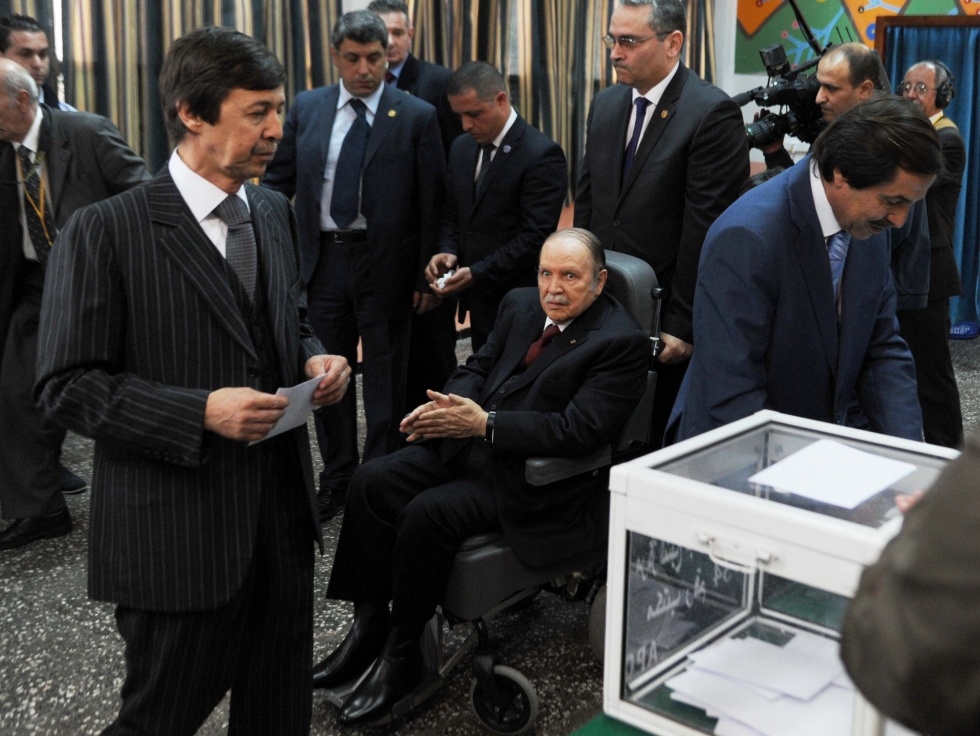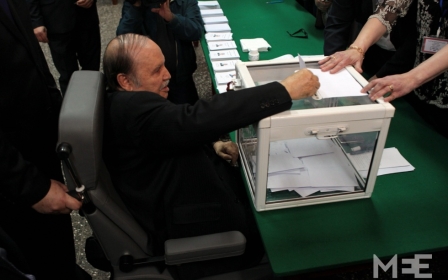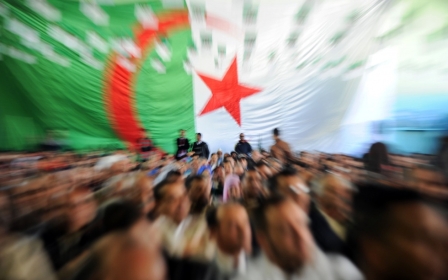Bouteflika expected to win; Benflis vows to fight any fraud

Algerian President Abdelaziz Bouteflika has won a fourth term in office with 81.53 percent of the vote, the country's interior minister announced Friday afternoon.
While Bouteflika is widely expected to take the election, his key contender, Ali Benflis, has vowed to react strongly against any proof of voter fraud. Reacting to the results, some Algeria observers, including analyst Imad Mesdoua, say the key now will be watching Benflis' camp to see its reaction.
In the final week leading up to the vote, the Bouteflika campaign went into attack mode against Ali Benflis, a competing National Liberation Front candidate whose campaign has gained most traction and who is seen as the only real challenger.
Tensions between the two was rife. Bouteflika’s supporters accused the Benflis campaign of instigating violence, while Benflis declared that he had prepared an “army” of some 60,000 election monitors from his campaign to prevent alleged instances of widespread fraud in Bouteflika’s favour.
During the elections on Thursday, there were allegations of irregularities, mostly coming from the Benflis campaign, and also problems with some voters finding that they were no longer registered. Amira Haddadi, a 22-year-old political science student, said Benflis' accusations had served to raise public awareness.
New MEE newsletter: Jerusalem Dispatch
Sign up to get the latest insights and analysis on Israel-Palestine, alongside Turkey Unpacked and other MEE newsletters
“Even if there was fraud in this election," she said, "there won’t be in the next one because people will be more aware of it."
But despite the tensions on Thursday, Middle East Eye found the Benflis campaign in surprisingly good spirits before the results were announced.
“I’ve met huge enthusiasm,” the leading reformist candidate told MEE, noting that he was proud to have found the country’s youth so receptive to his message of change.
“In general, people are fed up. People are sure they don’t want a continuation of the current regime,” he says. “I explained I’m not a man who wants to cling to power.”
Asked whether he would still support the ban on public demonstrations that was introduced in 2001 when he was prime minister, Benflis had told MEE that he would immediately lift all bans on protests. He also reaffirmed support for a Tunisia-style national dialogue process and a new Algerian constitution.
Benflish would hardly have been a break with the oligarchy who have dominated Algerian political life for so many decades. He has served as both FLN secretary-general and prime minister, and is himself implicated in overseeing voter fraud in the 1999 elections that first brought Bouteflika to power.
Bouteflika has come under fire for his frail health, which his opponents believed should have prevented him from seeking a fourth term. The 77-year-old was hospitalised for three months in mid-2013, after suffering a major stroke, and remains largely incapacitated, although he did make a rare television appearance on Thursday as he went to cast his vote.
His appearance on Algerian state television, however, is unlikely to quell speculation over the state of his health - Bouteflika didn’t make any statement, and an assistant had to put his vote in the envelope. Most other Algerian media, many of which have been highly critical of his re-election bid, were barred from the polling station.
The official participation rate was 37% as of 5pm, according to the Interior Ministry. This is significantly lower than in previous elections.
In two polling rooms in the capital of Algiers - in the low-income suburbs of Baraki and Bab El Oued - election officials told Middle East Eye that the turnout rate hovered between 20-30 percent of registered voters.
The suppression of political dissent has intensified in the months leading up to the vote and continued on election day.
Isolated clashes and street violence were reported in several places in the Berber-speaking provinces of Bouira (90 km east of Algiers) and Bejaia (260 km east of Algiers).
Overall, however, the prevailing mood was largely one of either disinterest in the election, rather than protest, and the mood did not appear tense.
Sofiane Aideli, a cinema organiser in the town of Bejaia, in the eastern region of Kabyle where Bouteflika is particularly unpopular, said that aside from a few incidents at polling stations, it was a day like any other.
“No one is going to vote besides a few old FLN loyalists,” Aideli says. “Going to vote doesn’t achieve anything and won’t bring any change.”
For all the controversy, Bouteflika continued to have his supporters.
Fatima, a 51-year-old woman in Baraki told MEE that she cast her ballot for the current president because of the stability the Bouteflika years had on her family situation. Her family was one of many to move from a nearby town to more modern apartments in 2012 thanks to a government-sponsored scheme.
“I voted for the future of our children,” Fatima said.
Mesdoua, the Algerian analyst,had predicted victory for Bouteflika. The unpredictable factor in the campaign, he notes, is how the Benflis campaign will react to the results.
“How far he [Benflis] decides to take his ‘rejection’ of the election results will determine what comes next really,” Mesdoua says.
Given Benflis' previous stints in power, however, many commentators argue that the Bouteflika-Benflis friction is simply a ruse to create a sense of competition, and that Bouteflika will take the day regardless.
The Algerian political sphere is notoriously opaque and routinely described by analysts as “façade democracy”. Many opposition figures prefer to remain outside what is widely referred to as “The System,” arguing participation is by definition co-option.
Mesdoua argued that while Benflis is undoubtedly closely tied with the current oligarchy, his backers represent the reformist current and the conflict between their camp and that of Bouteflika's supporters is very real.
“To label his campaign as a puppet mock campaign might be a bit of an exaggeration,” he says.
-- With additional reporting from Massinissa Benlakehal and Eileen Byrne in Algiers.
Middle East Eye delivers independent and unrivalled coverage and analysis of the Middle East, North Africa and beyond. To learn more about republishing this content and the associated fees, please fill out this form. More about MEE can be found here.



